April 21, 2005
Drugs, sex and databases
I have not mentioned my CNE Health blog entries for a while, so it might be worth listing a few highlights (or at least, recent ones):
- Trusting the "armed and dangerous" Pharma Industry? - on the recent UK report on the undue influence of pharma companies on doctors.
- Selecting sex selection? - on the UK report in favor of allowing non-medical sex selection. This was a subject I even got to debate on Swedish television in Studio 24.
- Informed choice from informed databases - on the new EU plan to create a database with information for the health consumers.
- The best medicine - yes, a good laugh really does prolong life by reducing stress.
- The right drug for the right person - on the pharmacogenetics of recreational drugs and their side effects.
Why so much UK stories? Besides that I like BMJ, I think it is because UK has one of the more active biopolitical debates. In most other EU countries the debate is largely dead - people are stuck in an imagined consensus and nobody can rock the boat. There might be debates, but they are traditional trench warfare between groups with fixed positions. There are few new ideas thrown around. The UK seems to have more dynamics in the biopolitical debate, and that is a good sign since it can be exported. "Look what the British are thinking!" is of course a bit like the 80's "The Japanese are doing it", but if it works to get a more dynamic biopolitic debate going I'm all for it.
April 13, 2005
The Sounds of Science
I like music with unusual or scientific themes. The Norman Borlaug Rap (Thank You, Norman), a biotech political rap about the green revolution certainly qualifies.
It is quite good quality-wise; most of the biotech songs that can be found are either intended for children or sung by scientists that (hopefully) are better at research than singing. Rapping children might be annoying, but it is for a good cause and much nicer to the ears than rapping computer scientists (although had I recalled the advice in this song I would have saved months of debugging).
It is interesting to note how much science songs there are out there. One might think that given the importance of science in our culture many conventional artists would express it, but that is unfortunately not so. Celebrating the growth of knowledge is sadly out of fashion in the mainstream. So instead scientists make their own folk songs, expressing the beauty, humor or confusion of science and academia.
I have not found the same amount of filking about other areas - where are the songs about philosophy, sociology or postcolonial studies? My guess is that the discrepancy is partially due to the two culture split, isolating the natural sciences from mainstream culture so that they have to develop their own expressions, and partially because of the firm faith many scientists hold in the objective correctness of their field. One can make fun of Maxwell's equations or general relativity without in any way lessening their importance or usability. They remain as true no matter what anybody sings. But what happens if a social science theory is ridiculed? Given that many constructions within the humanities are based on hermeneutical interpretations that at least partially hinge on the credibility of their creators or a sense of shared belief in the cultural assumptions, they are actually affected by cultural expressions that make them look silly.
Some other notable scientific music I have found is:
Genomic Dub, a group that celebrates genomics and evolutionary biology through Dub music.
My Dissertation by Science Groove, a CD with lyrics taken from a dissertation in biological statistics.
The Man Who Mistook His Wife For a Hat by Michael Nyman. A chamber opera by a mainstream composer based on Oliver Sacks classic. I can't resist songs with titles like "But what of the parietal regions?". It also seems to be a careful treatment of the humanistic issues of Sacks text.
Love the World
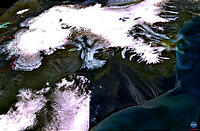
I am in love. I downloaded NASA World Wind two days ago, and now I can't imagine living without it. A bit like Google.
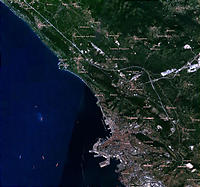
WorldWind is basically a digital globe application that allows the user to zoom in on any part of the world, which is rendered using available satelite photos. But the combination of direct interaction, enormous datasets and extensibility produces a marvelous synergy. None of the pieces are new, but here they turn into art.
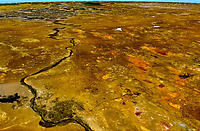
I can zoom in on the Aral Sea to watch how it dries out, with a flick of the mouse scoot over to watch the steppes around Baikonur (I wonder which of the black and red stains are results of the space program). A further gesture and I can explore the Himalayas, follow my mother's trip through Mongolia and then scoot over to Australia to compare desert landforms.
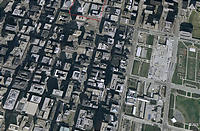
Even better, different kinds of data and animations can be overlaid on top of the globe. Climate variations, satelite photos of recent events, historical treks and nation boundaries. As well as the magnificient (and yet eerie) USGS 1m resolution imagery of urban areas in the US.
This is how I envisioned the program "Earth" mentioned in Stephenson's Snow Crash. A framework for displaying all kinds of geographical information, networked, near-realtime, from a multitude of sources.
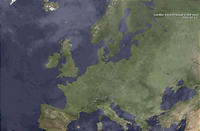 The system is not perfect, of course. A major bottleneck seems to be the bandwidth of the picture servers. When I installed the software I was pleased to see that it used bittorrent for downloading (when I needed to install the 10 times smaller Windows .Net to make the program run the download took 10 times as long). Maybe an extension of WorldWind ought to make the users act as a torrent? Most of the world is not equally watched (it would be fun to get the statistics of where people look as an overlay in the program - a "Am I Hot or Not?" for geography), and people are sitting with copies of the images on their hard drive caches. Use Nasa servers as seeds, and then let the user community share the bandwith burden. Ought to scale nicely.
The system is not perfect, of course. A major bottleneck seems to be the bandwidth of the picture servers. When I installed the software I was pleased to see that it used bittorrent for downloading (when I needed to install the 10 times smaller Windows .Net to make the program run the download took 10 times as long). Maybe an extension of WorldWind ought to make the users act as a torrent? Most of the world is not equally watched (it would be fun to get the statistics of where people look as an overlay in the program - a "Am I Hot or Not?" for geography), and people are sitting with copies of the images on their hard drive caches. Use Nasa servers as seeds, and then let the user community share the bandwith burden. Ought to scale nicely.